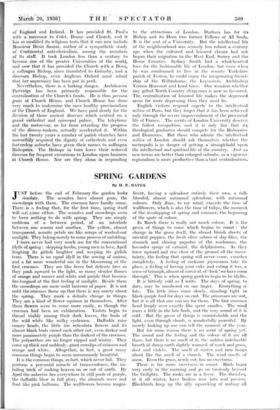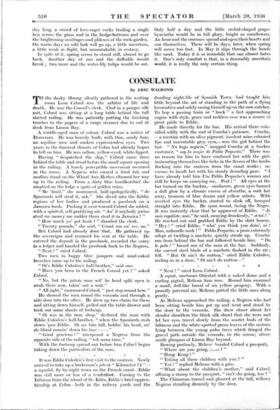SPRING GARDENS
By H. E. BATES
will. (Mille either. The aconites and snowdrops seem to have nothing to do with spring. They are simply, emblems of a between. period, of an interlude between one season .and another... The yellow, almost transparent, aconite petals are like scraps of washed-out sunlight. They belong merely to some process of unfolding.
I have never had very much use .for the conventional idylls.of spring : skipping lambs, yoUng men in love, April laughing its girlish_ laughter and weeping its girlish tears. There, is an equal idyll in the sowing of onions, and a far more wonderful one in the blossoming of the firSt. crocuses. They are like fierce but delicate fires as they push upward to the light, so many slender flames of orange and mauve and white and purple that become fire-tongued at the first feeling of sunlight. Beside them the snowdrops are mere unlit lanterns of paper. It is not until the crocuses flame up.that there is any surety about the spring. They" mark a definite change in things. They ,are kind of flower equinox in themselves. After them flowers seem. to come more easily, .8s-though the crocuses had been an exhilaration. Violets begin to thread visiblyamong their dark leaves, the buds of the . wild",white like milky cyclamen. Daffedils raise canary .headi, the little iris reticulata flowers and its almost bliek buds crowd each other Out, even darker and more pas.sionately purple than the darkest of the crocuses. The polyanthus are no longer nipped and wintry. They come up thick and suddenly, giant cowslips of crimson and orange, and white. Altogether, in fact, a great many common things begin to seem uncommonly beautiful. It is the common things, in fact, which never fail. They perform ..a perennial miracle of transcendence, the Un- failing trick- of making heaven on or 'out of earth. By April the atibretia lies everYwhere in still pools of purple, the daffOdili blow in fidl glory, the almonds wave and float like pink balloons. The wallflowers becoMe magni- ficent, having a splendour entirely their own, a full- blooded, almost autumnal. splendour, with autumnal colours. Only June, to my mind, exceeds the time of wallflowers, which is also the time of tulips, the moment, of the overlapping of spring and summer, the beginning of the spate of colour. . .
In March there is really not much colour. It is the green of things to come which begins to count : the change in the grass itself, the almost bluish shoots of oriental poppies, the .fresh olive sabres of day-lilies, the staunch and shining pagodas of the madonnas, the lavender sprigs of catmint, the delphiniums. As they force upward and rise clear of the ground all the uncer- tainty, the feeling that spring will never come, vanishes completely. A feeling of cocksure joyousness take its place, a feeling of having your cake and eating it too, a sense of triumph, almost of survival, of ' look ! we have come through.'. This is when. spring gardens begin to be idyllic.
It is"bitterly cold as I write. The days of spring, to date, may be numbered on one finger. EVerything is late. The little irises come slowly, standing tight in black-purple bud for days on end. The primroses arc out; but it is all that one can say for them. The first crocuses, bend limply over exactly like spent candles. The wind roars a little in the late buds, and the very sound of it is cold. But the green of things is unmistakable and the light, even through clouds, is wonderfully powerful., By merely looking up one can tell the moment of the year. But for some reason there is no scent of spring yet: The sound and the feeling and the colour of it are all there, but there is no smell of it, the sudden indefinable breath 'of damp earth slightly warmed, of muck and grass, dust and violets. The smell of winter and rain hangi about like the smell of a church. The wind smells, of snow. Even the grass, newly cut, has no sweetness.
There, is far more sweetness in sound. Birds begirt Very early in the morning and go on tirelessly beyond the twilights. The rooks are in a fever. The thrashes; at it all winter, have broken now into real passion. Blackbirds keep up the silly squawking of mating all day long, a crowd of love-eager cocks trailing a single hen across the grass and in the hedge4lottoms and over the brightening saxifrages and Phloxes of the rock-garden. On warm days an odd lark will go up, a little uncertain, a little weak in flight, but unmistakable in ecstasy.
In spite of it, spring seems to stand still, almost to go back. Another day of sun and the daffodils would break ; two more and the water-lily tulips would be out. Only half a day and the little orchid-shaped grape- hyacinths would be in full glory, bright as cornflowers. An hour and the crocuses spread and open their hearts and sun themselves. There will be days, later, when spring will move too fast. In May it slips through the hands like sand. Today it is so immobile that one almost hates it. One's only comfort is that, in a damnably uncertain world, it is really the only certain thing.



































































 Previous page
Previous page